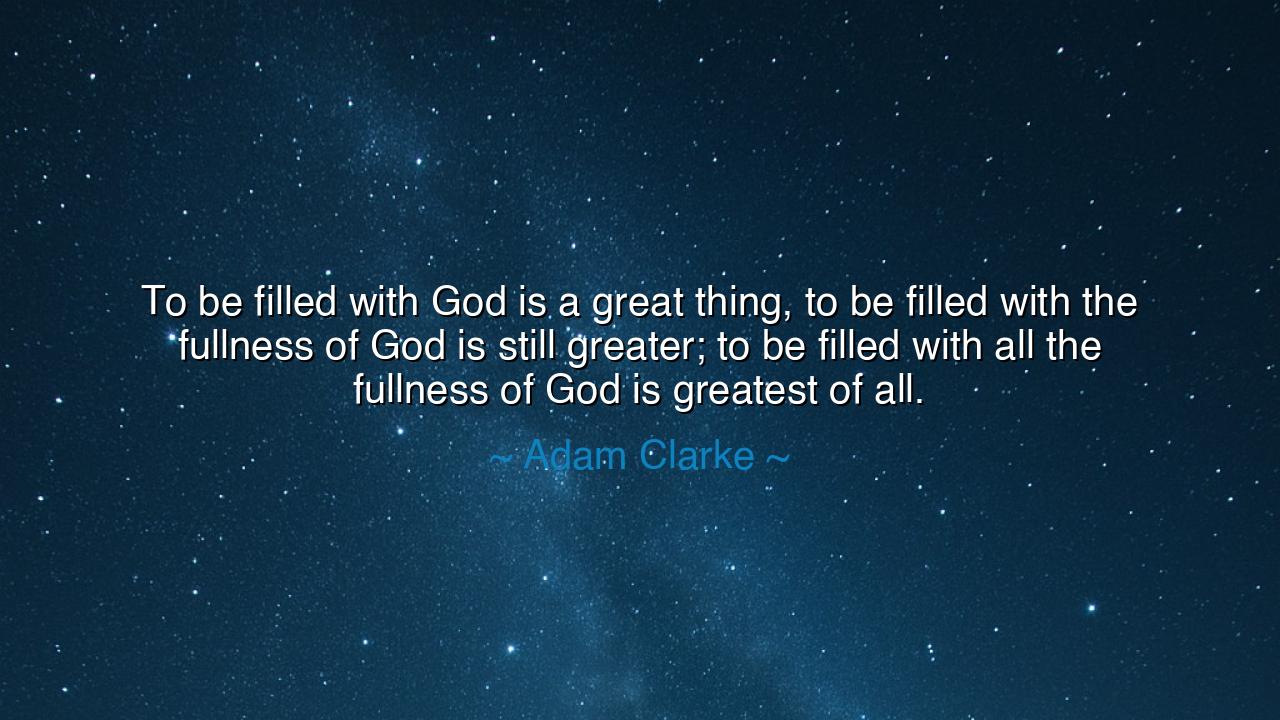
To be filled with God is a great thing, to be filled with the
To be filled with God is a great thing, to be filled with the fullness of God is still greater; to be filled with all the fullness of God is greatest of all.






“To be filled with God is a great thing, to be filled with the fullness of God is still greater; to be filled with all the fullness of God is greatest of all.” — Adam Clarke
Thus spoke Adam Clarke, the devoted theologian, the scholar of Scripture whose life was an offering to divine understanding. His words rise like a sacred hymn — an ascent of the soul through degrees of holiness. They are not merely poetic, but deeply spiritual, revealing the yearning of a heart that sought not only to know God, but to be transformed by Him. In this progression — from “filled with God,” to “filled with the fullness of God,” to “filled with all the fullness of God” — Clarke describes the sacred journey of the spirit, from simple faith to perfect union, from belief to divine communion.
The origin of this quote lies in Clarke’s commentary on the Epistle to the Ephesians (3:19), in which the Apostle Paul prays that believers “may be filled with all the fullness of God.” Clarke, a Methodist theologian of the early 19th century, saw in this verse the highest aspiration of the Christian soul. To him, the relationship between humanity and God was not distant or symbolic — it was intimate, living, transformative. His words express not theology alone, but ecstasy: the longing of a soul that desires to be so imbued with divine presence that nothing earthly remains.
To be “filled with God” is to allow His Spirit to dwell within — to live by faith, to walk in love, to act with compassion. This is the beginning of the spiritual life, when the heart awakens to its Maker. To be “filled with the fullness of God” is to go beyond belief into transformation — when one’s thoughts, desires, and deeds are shaped by the divine pattern. But to be “filled with all the fullness of God” — this, says Clarke, is the summit of spiritual existence, when the self is utterly surrendered, and the soul becomes a vessel of pure light. It is not the extinction of the self, but its completion — the human heart made vast enough to reflect eternity.
Consider the example of Saint Francis of Assisi, who walked this path in life. Once a wealthy merchant’s son, he abandoned all possessions to follow the voice of God. As he prayed, served, and suffered for others, his being became filled with compassion so profound that even nature itself seemed to recognize it — birds gathered at his feet, and wolves grew tame in his presence. Francis did not seek glory or miracle; he sought oneness with his Creator. By emptying himself of pride and possession, he became, as Clarke describes, “filled with all the fullness of God.” His life became the echo of divine love, the living scripture written not in ink, but in action.
In this way, Clarke’s quote is not only a meditation on divinity but a guide to living. He teaches that to draw closer to God, one must first empty oneself — of vanity, of resentment, of desire for worldly power. The vessel cannot be filled if it is already full. Each step — from faith, to surrender, to divine union — requires humility and perseverance. The more we make room for what is eternal, the less room remains for what is transient. To be “filled with all the fullness of God” is to live so deeply in love that one becomes a conduit of grace, bringing peace to others through presence alone.
There is also a quiet truth hidden in Clarke’s words: that fullness is not gained by effort alone, but by invitation. The divine cannot be seized; it must be received. Just as the ocean fills the empty shell cast upon its shore, so too does God fill the soul that opens itself in trust. This is the mystery of faith — that the greatest strength comes from surrender, the greatest power from gentleness, the greatest wisdom from silence.
Let this, then, be the lesson: seek not to be mighty in your own will, but to be spacious in your spirit. Empty your heart of bitterness, and let compassion dwell there. Empty your mind of vanity, and let wisdom find room. Empty your soul of fear, and let God’s fullness flood it like the dawn. For the measure of a life is not what it contains of the world, but what it receives of the divine.
And so, my child of the future, remember the wisdom of Adam Clarke. Do not settle for being merely good, or merely faithful — strive to be filled, and then filled again, until the love that moves the stars moves also within you. For to be filled with God is great, to be filled with His fullness is greater — but to be filled with all His fullness is to touch eternity itself, and to become what humanity was always meant to be: a mirror of the divine heart, shining endlessly into the world.






AAdministratorAdministrator
Welcome, honored guests. Please leave a comment, we will respond soon